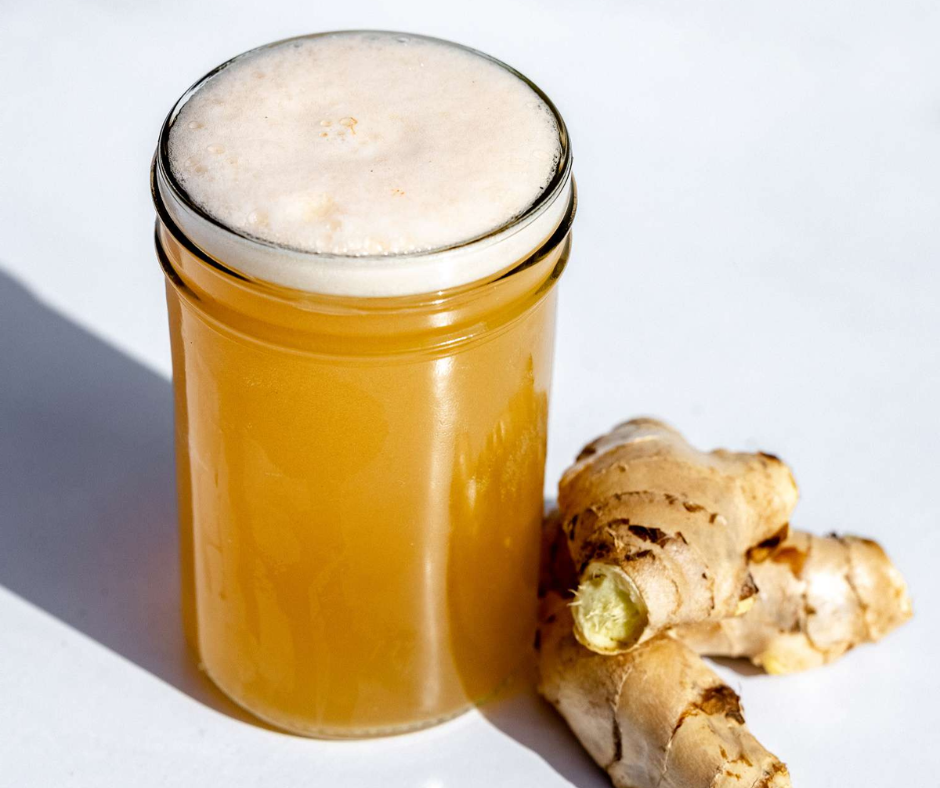Introduction
Ginger beer has recently gained popularity as a refreshing and flavorful beverage. But Is Ginger Beer Good for You? In this article, we will explore the health perks of ginger beer and discover its potential benefits. From its historical significance to its rise in popularity, ginger beer has a fascinating story that goes beyond just being a tasty drink.
What Is Ginger Beer And Its Historical Significance
Ginger beer is a carbonated beverage made from fermented ginger, sugar, and water. It has a distinct ginger flavor with a touch of sweetness. Ginger itself has been used for centuries for its medicinal properties. It is known for its anti-inflammatory and digestive benefits and ability to alleviate nausea and improve circulation.
Ginger beer has a long history that dates back to the 18th century. It originated in England and was a popular drink among sailors, thanks to its ability to relieve seasickness. It was initially brewed as a low-alcohol beverage, but today, most commercially available ginger beers are non-alcoholic.
The Rise In Popularity Of Ginger Beer
In recent years, ginger beer has experienced a surge in popularity, not just as an ingredient in cocktails. Many people are now consuming ginger beer for its potential health benefits. Here are some of the reasons why ginger beer has become a favorite beverage among health-conscious individuals:
- Digestive Aid: Ginger is known for aiding digestion by promoting the production of digestive enzymes. It can help relieve indigestion, reduce bloating, and improve overall gut health.
- Anti-Inflammatory Properties: Ginger contains compounds called gingerols, which have potent anti-inflammatory effects. Regular consumption of ginger beer may help reduce inflammation in the body, which is often linked to various chronic diseases.
- Nausea Relief: Ginger has long been used as a natural remedy for nausea, including morning and motion sickness. Ginger beer provides a convenient and tasty way to consume ginger and alleviates nausea.
- Improved Circulation: Ginger has been found to stimulate blood flow and improve circulation, which can benefit overall health. Drinking ginger beer may help enhance cardiovascular health and promote better blood flow.
It is important to note that while ginger beer may offer potential health benefits, it should not be relied upon as a substitute for medical treatment. It is always best to consult with a healthcare professional if you have any specific health concerns or conditions.
In conclusion, ginger beer can be a delicious and refreshing beverage with potential health perks. Its historical significance, as well as its rise in popularity, showcases the positive qualities and benefits of this beverage. However, it is important to consume ginger beer in moderation, as it can still contain sugar and calories. Overall, incorporating ginger beer into a balanced and healthy lifestyle may be an enjoyable way to harness the potential health benefits of ginger.

Health Benefits Of Ginger Beer
Relieves Nausea And Improves Digestion
Ginger beer, with its main ingredient being ginger, offers potential health benefits, particularly in relieving nausea and improving digestion. Ginger has long been recognized for its ability to alleviate various forms of nausea, including morning and motion sickness. Consuming ginger beer provides a convenient and enjoyable way to consume ginger and potentially relieve nausea symptoms.
Moreover, ginger is known for its beneficial effect on digestion. It stimulates the production of digestive enzymes, which can aid in breaking down food and improving the overall digestive process. This can help reduce common digestive issues such as indigestion, bloating, and discomfort. By incorporating ginger beer into your diet, you may experience improved digestion and greater well-being.
Anti-inflammatory And Anti-cancer Properties
Gingerols, the compounds found in ginger, possess potent anti-inflammatory properties. Regular consumption of ginger beer can help reduce inflammation in the body, which is often associated with chronic diseases such as arthritis, heart disease, and certain types of cancer. By reducing inflammation, ginger beer may contribute to overall improved health.
Additionally, studies have suggested that gingerols and other bioactive compounds found in ginger have potential anti-cancer effects. Ginger has been shown to inhibit the growth of cancer cells and induce cell death in various types of cancer. While more research is needed in this area, these findings provide promising insights into the potential health benefits of ginger beer.
It’s important to note that while ginger beer offers potential health perks, it should not be relied upon as a substitute for medical treatment. It is always best to consult a healthcare professional before incorporating ginger beer into your diet if you have specific health concerns or conditions.
In conclusion, ginger beer can be a delicious and refreshing beverage with potential health benefits. Its ability to relieve nausea, improve digestion, and possess anti-inflammatory and potentially anti-cancer properties make it an intriguing choice for those seeking a natural remedy. However, moderation is key, as ginger beer can still contain sugar and calories. By incorporating ginger beer into a balanced and healthy lifestyle, you may be able to harness the potential health benefits of ginger and enjoy its unique flavor.

Making Ginger Beer At Home
Step-by-step Guide To Brewing Ginger Beer
Ginger beer is a delicious and refreshing beverage that offers potential health benefits. Making ginger beer at home allows you to control the ingredients and customize the flavor. Here is a step-by-step guide to brewing ginger beer:
- Gather the Ingredients: You will need fresh ginger root, sugar, water, lemon juice, and active dry yeast.
- Prepare the Ginger: Peel and grate the ginger root. The amount of ginger you use will depend on your preference for a milder or spicier flavor.
- Create the Ginger Paste: Place the grated ginger in a bowl and add sugar. Mix them until it forms a paste.
- Boil the Mixture: In a saucepan, bring water to a boil. Add the ginger paste to the boiling water and simmer for 10 minutes to infuse the flavor.
- Cool and Strain: Allow the ginger mixture to cool completely, then strain it to remove the ginger pulp.
- Add Lemon Juice and Yeast: Add lemon juice and active dry yeast once the ginger mixture has cooled. Stir well to incorporate the ingredients.
- Bottle and Ferment: Pour the ginger beer into clean, sterilized bottles. Leave some headspace in each bottle to allow for fermentation. Seal the bottles tightly.
- Fermentation: Place the bottles in a warm and dark place for 24 to 48 hours to allow the ginger beer to ferment. Check the bottles regularly for carbonation build-up. Release some gas if needed to avoid an explosion.
- Refrigerate and Enjoy: Transfer the ginger beer to the refrigerator once the fermentation process is complete. Allow it to chill for a few hours before serving. Enjoy your homemade ginger beer!
Tips For Customizing And Enhancing The Flavor
While the basic ginger beer recipe is delicious, you can experiment with various flavors to enhance its taste. Here are some tips for customizing and enhancing the flavor of your homemade ginger beer:
- Add Fruits or Herbs: Consider infusing your ginger beer with fruits like pineapple, lime, or berries. You can also add herbs like mint or basil for a refreshing twist.
- Adjust the Sweetness: If you prefer a sweeter ginger beer, increase the sugar in the recipe. Alternatively, you can use natural sweeteners like honey or agave syrup.
- Play with Spices: Enhance the flavor profile by adding cinnamon, cloves, or cardamom spices. These spices can add warmth and complexity to your ginger beer.
- Experiment with Carbonation: If you enjoy a fizzy drink, you can increase the carbonation by fermenting the ginger beer for longer. Just be cautious not to let it ferment for too long, as it may become too carbonated and potentially explode.
- Try Different Yeast Strains: While the recipe calls for active dry yeast, you can experiment with different yeast strains to impact the flavor profile. Some strains may produce a more pronounced ginger flavor or impart unique characteristics.
Remember, brewing ginger beer at home requires patience and attention to detail. Follow the recipe carefully and make sure to sanitize all equipment to prevent any contamination. You can create your signature ginger beer that suits your taste preferences with practice and experimentation.
In conclusion, making ginger beer at home allows you to enjoy a delicious and potentially beneficial beverage while having full control over the ingredients. Whether seeking relief from nausea, improving digestion, or simply looking for a refreshing drink, ginger beer can be a great homemade option. Get creative with flavors and enjoy the process of brewing your ginger beer. Cheers to your health and enjoyment!

Is Ginger Beer Good For You?
Is Ginger Beer Alcoholic?
No, traditional ginger beer is typically non-alcoholic. However, it’s important to note that variations of ginger beer in the market may contain alcohol. These versions often fall under the category of alcoholic ginger beer and can have varying levels of alcohol content. It’s essential to read the labels or check with the manufacturer to determine the alcohol content before consuming ginger beer.
Can Ginger Beer Help With Weight Loss?
While ginger beer alone may not directly contribute to weight loss, it can be a beneficial addition to a balanced diet and healthy lifestyle. Here are a few ways ginger beer can potentially support weight loss efforts:
- Improved Digestion: Ginger, the key ingredient in ginger beer, has been used for centuries to aid digestion. It can help reduce bloating, alleviate nausea, and stimulate the production of digestive enzymes. A healthy digestive system is essential for efficient nutrient absorption and waste elimination, which may indirectly support weight loss.
- Increased Metabolism: Ginger has thermogenic properties, which can slightly increase the body’s metabolic rate. While the effect may be modest, every little boost in metabolism can contribute to calorie burning and potentially support weight loss efforts.
- Hydration Alternative: Opting for ginger beer as a hydrating beverage choice instead of sugary sodas or other high-calorie drinks can help reduce overall calorie intake. By replacing calorie-dense beverages with a low-calorie option like ginger beer, you can create a calorie deficit, which is key for weight loss.
Additional Potential Health Benefits Of Ginger Beer
Besides the potential weight loss support mentioned above, ginger beer offers other health perks. Here are some additional benefits:
- Anti-Inflammatory Properties: Ginger contains powerful anti-inflammatory compounds called gingerols. These compounds have been studied for their potential in reducing inflammation. Chronic inflammation is associated with various health conditions, including arthritis and heart disease.
- Anti-Nausea and Digestive Aid: Ginger has long been a natural remedy to alleviate nausea and promote digestion. Ginger beer, with its ginger content, can be a refreshing and soothing option to ease an upset stomach.
- Antioxidant Boost: Ginger is rich in antioxidants that can help protect the body against damage from free radicals. Antioxidants are essential in maintaining overall health and reducing the risk of chronic diseases.
It’s important to note that these potential benefits are associated with ginger, the main ingredient in ginger beer. However, the specific health benefits and the extent to which they are present in ginger beer may vary depending on the brewing process and the quantity of ginger used.
In summary, to answer ‘Is Ginger Beer Good for You?’, ginger beer can be a flavorful and potentially beneficial addition to a healthy diet. While it may not directly contribute to weight loss, it can support digestion and hydration and provide various potential health benefits. As with any food or beverage, moderation is key. It’s always best to consult a healthcare professional before significantly changing your diet if you have any specific health concerns or dietary restrictions. Enjoy a refreshing glass of ginger beer and savor its unique flavor while reaping its potential health perks.
Conclusion
Now you should know the answer to ‘Is Ginger Beer Good for You?’. Ginger beer is a versatile and healthful beverage that offers a range of potential benefits. While traditional ginger beer is typically non-alcoholic, it’s important to check the labels or consult the manufacturer for variations containing alcohol. Although ginger beer may not directly contribute to weight loss, it can be valuable to a balanced diet and healthy lifestyle. The key ingredient, ginger, has been used for centuries to aid digestion, stimulate metabolism, and support hydration as a low-calorie alternative to sugary drinks.
In addition to potential weight loss support, ginger beer offers other health perks. The anti-inflammatory properties of ginger can help reduce inflammation in the body, which is associated with various health conditions. Ginger is also known for its anti-nausea and digestive aid benefits, making ginger beer a refreshing and soothing option for an upset stomach. Furthermore, ginger is rich in antioxidants, which are crucial in maintaining overall health and reducing the risk of chronic diseases.
It’s important to note that the specific health benefits and the extent to which they are present in ginger beer may vary depending on the brewing process and the quantity of ginger used. As with any food or beverage, moderation is key. It’s always best to consult a healthcare professional before significantly changing your diet if you have any specific health concerns or dietary restrictions.
Ginger beer can be a flavorful and potentially beneficial addition to a healthy diet. With its unique taste and potential health perks, it’s no wonder why ginger beer has gained popularity as a refreshing beverage choice. So pour yourself a glass of ginger beer and savor the delightful flavors while reaping its potential health benefits.
FAQ: Is Ginger Beer Good for You? – Ginger Beer Benefits: Discovering Its Health Perks
Q: What is ginger beer?
A: Ginger beer is a carbonated beverage made from fermented ginger root, sugar, and water. It originated in the Caribbean but has gained popularity worldwide over the years.
Q: Is ginger beer alcoholic?
A: Traditionally, ginger beer was brewed as an alcoholic beverage, but most commercially available ginger beers today are non-alcoholic. However, some brands do produce alcoholic versions, so it’s important to check the label if you want to avoid alcohol.
Q: What are the health benefits of ginger beer?
A: Ginger beer offers several potential health benefits, primarily due to the properties of ginger. It may help alleviate digestive issues, reduce inflammation, boost the immune system, relieve nausea and motion sickness, and aid in reducing muscle soreness.
Q: Does ginger beer help with digestion?
A: Ginger, the primary ingredient in ginger beer, has been used for centuries to aid digestion. It may help alleviate symptoms such as bloating, indigestion, and stomach discomfort. However, it’s important to note that individual experiences may vary.
Q: Can ginger beer reduce inflammation?
A: Ginger contains compounds called gingerols, which have anti-inflammatory properties. Regular consumption of ginger beer may help reduce inflammation in the body, which can be beneficial for individuals with inflammatory conditions such as arthritis.
Q: Does ginger beer boost the immune system?
A: Ginger has immune-boosting properties due to its antioxidant and antimicrobial effects. While ginger beer may contribute to overall immune health, it should not replace a balanced diet and a healthy lifestyle when considering immune system support.
Q: Can ginger beer relieve nausea and motion sickness?
A: Ginger has long been used as a natural remedy for nausea and motion sickness. Ginger beer could potentially help alleviate these symptoms, but it may not be as effective as consuming ginger in its raw form or as a concentrated supplement.
Q: Does ginger beer help reduce muscle soreness?
A: Ginger contains pain-relieving and anti-inflammatory compounds that could potentially aid in reducing muscle soreness and improving recovery after exercise. However, more research is needed to determine its specific impact on muscle soreness.
Q: Are there any potential downsides to drinking ginger beer?
A: While ginger beer can offer health benefits, it is important to note that commercially available ginger beers often contain added sugars, artificial flavors, and preservatives. These ingredients may have negative effects on overall health, especially when consumed in excess.
Q: Is ginger beer suitable for everyone?
A: Ginger beer is generally considered safe for most people when consumed in moderation. However, individuals with certain health conditions, such as gallstones or a bleeding disorder, may need to limit or avoid consuming ginger beer. It’s always best to consult with a healthcare professional if you have any specific concerns or medical conditions.
Q: How much ginger beer is recommended for consumption?
A: There is no specific dosage recommendation for ginger beer. Moderation is key when it comes to any beverage containing added sugars. If you choose to consume ginger beer for its potential health benefits, it’s advisable to enjoy it in moderation as part of a balanced diet.
It’s worth noting that ginger beer should not be used as a substitute for any prescribed medications or medical treatments. If you have any medical concerns, it’s essential to consult with a healthcare professional before making any significant dietary changes.

Andre Lotz immigrated to the United States from South Africa almost 20 years ago. Still, he didn’t feel truly at home until he settled in Mobile—a city that reminds him of his childhood home of Fish Hoek on the southern cape of Africa.

